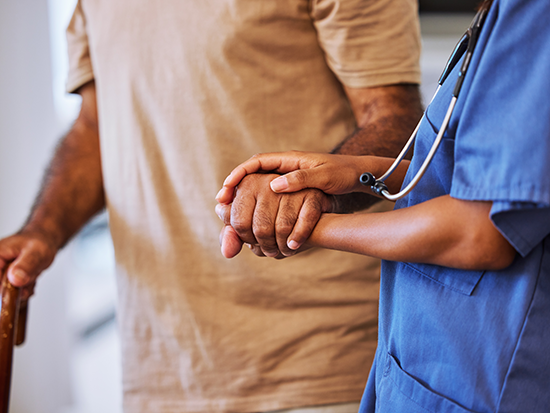An expert from the new UAB Falls Clinic provides tips on how to keep older adults safe from falls.

Causes
While there are multiple reasons for falls, some common causes may include:
- Slow reflexes, poor vision and hearing
- Certain conditions such as diabetes and heart disease
- Problems with sensation and motor or mobility function to the lower extremities, such as the legs and feet, can affect balance
- Medications that cause dizziness and/or drowsiness
- Cognitive impairment
- Age-related decreased muscle mass
- Problems with balance and mobility
- Safety hazards in the home such as small pets, loose floor coverings, cluttered walkways or spaces, and darkened rooms
Prevention
By taking care of one’s overall health, individuals may decrease their chance of falling. Gray-Waites recommends staying physically active and working with a professional to develop an exercise program. Exercising strengthens muscles while helping keep the body flexible and improve balance.
“Another way to prevent falls is to take preemptive steps,” Gray-Waites said. “Fall-proof living areas by making sure there are handrails in areas where stairs are being used, removing clutter from walkways, using nightlights or motion-sensor lights in dimly lit areas, and securing small pets in a cage at night to avoid tripping over them. By taking these small steps, you can prevent injuries in the long run.”
Gray-Waites recommends using assistive devices such as walkers or canes to move throughout one’s living area and wearing shoes that have a strap on the back and are firmly secured to the feet. If an individual is experiencing mobility issues, it is important that they speak to their doctor, so they can get the equipment they need to assist with mobility.
Some older adults may avoid communicating that they have fallen or are experiencing mobility issues, because they fear losing their independence.
“Older adults want to be able to stay at home as long as they can by themselves,” Gray-Waites said. “Fortunately, there is technology available today that can help them maintain their independence, while also keeping them safe. Put cameras in areas where falls are more likely, so caregivers can check on their family members throughout the day. Wear an emergency alert button around your neck or always keep your phone on you, so if you do fall, you can quickly call someone for help.”
People who may have conditions that cause their blood pressure to bottom out need to get up slowly to try to prevent their blood pressure from dropping and causing dizziness.
“If an individual falls one time, and they do not take steps to prevent themselves from falling again, within six months, they are most likely going to fall again,” Gray-Waites said. “That is why it is so important to take these preventive steps.”
Response
If a fall occurs, the first thing to do is to take a breath and try to stay as calm as possible. Next, assess if the individual is injured. If the person does not appear to be injured, help them get to a chair by first getting in a kneeling position and then slowly using a chair to push themselves up and turning the body to sit in the chair. Once seated, reassess for injuries and look for signs of bleeding, broken bones, breathing problems or a concussion.
If a person appears to be seriously hurt or if they are unable to get up on their own, call 911 and wait for help to arrive.
For residents who live near Birmingham, UAB Hospital-Highlands is home to one of the few accredited geriatric emergency departments in the state, region and world. The geriatric ED is part of a specialized pathway for older adults to allow them to feel more comfortable during their visit.
Upon arrival to the geriatric ED, older adults will undergo an Identification of Seniors at Risk assessment. The ISAR results assist in identifying patients who may need a more comprehensive assessment in the ED. Based on a patient’s score, a geriatric emergency nursing intervention expert, or GENIE nurse, may come in and complete additional screenings to identify any needs that must be met before the patient can be safely discharged. The GENIE nurse will share the screening results with the medical team to determine an appropriate treatment plan.
UAB Falls Clinic
UAB Medicine’s Physical Medicine and Rehabilitation Falls Clinic was created to help patients age 50 or older who are experiencing falls or balance problems. Patients who have fallen within the last six months are eligible for the UAB Falls Clinic. During clinic visits, the clinic’s specialists will perform a physical examination and conduct a fall-focused medical history review, which helps them identify risk factors and recommend changes to improve the quality of life for patients.
Some of the services provided include evaluation for mobility assistance devices such as canes, walkers, braces or other equipment; recommendations to assist in better management of medical conditions that may affect balance or contribute to falls, such as bowel/bladder incontinence, osteoporosis, and mental health conditions; and medication review/changes, including over-the-counter drugs and dietary supplements.
The Falls Clinic may provide recommendations for modifications to the home, such as handrails, shower/tub seating or a ramp, and provide referrals for therapy and exercise programs to help improve mobility. In addition, if patients need other services such as physical therapy, vision, hearing or foot care, the clinic will provide referrals to the appropriate medical specialist. The staff provides education to family and caregivers to help prevent falls in the future.
The Falls Clinic is located on the first floor of UAB Spain Rehabilitation Center. Patients can ask their doctor for a referral to the clinic or call 205-934-4694 to learn more.
